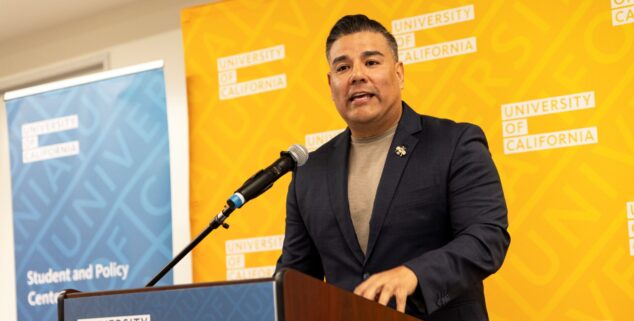News
California Insurance Crisis: a recap
 California Insurance Commissioner Ricardo Lara. Photo by Ellie Appleby, Capitol Weekly.
California Insurance Commissioner Ricardo Lara. Photo by Ellie Appleby, Capitol Weekly. On Wednesday, May 14, Capitol Weekly and the University of California Student and Policy Center hosted “California Insurance Crisis,” its first in-person gathering of the year and second conference of 2025. Held at the Student and Policy Center’s conference center, the event featured three panels and a keynote address from the California Insurance Commissioner Ricardo Lara. Discussions ranged from the overall state of the insurance industry to the impact of the Los Angeles wildfires and the path forward.
Panel 1: State of the Industry
In the first panel of the day, moderator and CalMatters economy reporter Levi Sumagaysay and three panelists discussed the many challenges the state’s insurance market faces, how the market got here and some possible solutions.
Panelists featured were Amy Bach, the executive director and co-founder of United Policyholders; Rex Fraizer, president of the Personal Insurance Federation of California; and Meredith Fowlie, a professor in the Department of Agricultural and Resource Economics at UC Berkeley.
 The panel began by highlighting a key indicator of the insurance market’s health: the number of homeowners enrolled in FAIR Plan policies, which has climbed to 575,000 as of March. While panelists agree that climate change has amplified the insurance crisis, they consistently pointed to California’s outdated insurance regulations as the root cause.
The panel began by highlighting a key indicator of the insurance market’s health: the number of homeowners enrolled in FAIR Plan policies, which has climbed to 575,000 as of March. While panelists agree that climate change has amplified the insurance crisis, they consistently pointed to California’s outdated insurance regulations as the root cause.
“What’s causing our problem is the regulations the Department of Insurance put in place in the early 1990s and have refused to change,” Frazier said. “If a company has to make a certain amount of money… and they’re not allowed to charge enough… what are they supposed to do?”
Bach called out the failure to reward consumer mitigation efforts.
“The biggest impediment we face right now is that people are not getting rewarded with renewals when they invest time and money,” she said.
Proposed solutions include faster rate approval processes, updated catastrophe (CAT) modeling and a stronger emphasis on community-wide mitigation. However, panelists expressed concern that even homeowners who invest heavily in fire-safe upgrades are often denied policy renewals.
Panel 2: Los Angeles wildfires
The “LA Fires” panel, moderated by journalist Dan Morain, explored the lived trauma, systemic gaps and policy failures in the wake of the devastating Altadena and Pacific Palisades fires.
Panelists included Sonoma County Supervisor James Gore; Steve Hawkes, senior director at Insurance Institute for Business & Home Safety; attorney Kelsey Szamet of Eaton Fire Survivors Network; and Nancy Wallace, professor of finance and real estate at the Haas School of Business at UC Berkeley.

Kelsey Szamet, Eaton Fire Survivors Network. Photo by Ellie Appleby, Capitol Weekly
Panelists detailed how climate-driven disasters, coupled with outdated infrastructure, unprepared systems and underinsurance, exacerbate the situation. In Altadena, for example, older homes with multiple layers of lead paint ignited during the fire, leaving survivors like Szamet unable to safely return, even if their structures were still standing.
“Did I ever in a million years as a sophisticated consumer and lawyer think my house was at risk? Never.” Szamet said. “We all woke up the next day, and the commercial corridor of Altadena had burned. Middle schools had burned. It was unimaginable… the community is in total traumatic grief and PTSD actively still.”
Wallace highlighted the vulnerability of California’s aging housing stock to wildfires, and Hawkes agreed that the building materials used only increase the risk of uncontrollable fires.
“The average home is 47 years old… A 47-year-old roof will not live through one of these fires,” Wallace explained.
The panel called for better modeling, stronger rebuilding standards and investment in mitigation.
Keynote: Insurance Commissioner Ricardo Lara
California Insurance Commissioner Ricardo Lara gave an impassioned keynote address. He acknowledged the state’s worsening insurance crisis and laid out a comprehensive plan to stabilize the market and restore consumer trust.
“We are in a statewide insurance crisis,” Lara said, “not a media-driven moment… but a real-life crisis impacting millions of Californians.”
He criticized decades of inaction by both regulators and legislators, calling out previous commissioners and advocacy groups for “playing by old rules” while the market crumbled. Lara said California’s current system, shaped by Proposition 103, is outdated and has failed to keep up with the realities of climate change and wildfire risk.
“No company is required to write a single policy under current rules,” he said, pointing out that insurers can raise rates and still refuse coverage, leaving many homeowners with no options other than the FAIR Plan.
Lara defended his decision to approve State Farm’s emergency rate hike, calling it a difficult but necessary move to avoid further destabilization. “We either allow for this increase… or they lose their coverage and end up in the FAIR Plan,” he explained.
The Commissioner also announced the creation of a Smoke Damage Task Force to address growing concerns about indoor contamination after fires. “Grandmothers are forced to scrub walls stained with soot and smoke before they can even introduce a claim,” he said. “This is happening now—horrible and unacceptable.”
While acknowledging that rates may continue to rise, Lara stated that the goal is to establish a more transparent and equitable system. “We’re not just rebuilding a market,” he said. “We’re rebuilding trust.”
Panel 3: What’s Next
In the final panel of the day, moderated by Capitol Weekly editor Rich Ehisen, panelists debated which is the more urgent issue, availability or affordability. The panel included Sen. Roger Niello (R-Placer/Sacramento), vice chair of the Senate Insurance Committee; Dr. Alex Hall, director of Environment and Sustainability and founder of the Wildfire Research Initiative at UCLA; John Norwood, principal of Norwood and Associates and a top legislative advocate for insurance and small business; and Denni Ritter, vice president of government relations at the American Property Casualty Insurance Association (APCIA).
“Right now, obviously, availability is the acute issue,” Niello said. “But when we move out a couple of years… affordability is most definitely going to be an issue.”

Rich Ehisen, Denni Ritter, Alex Hall, Sen. Roger Niello, John Norwood. Photo by Ellie Appleby, Capitol Weekly
Most panelists agreed that the availability issue needs to be addressed swiftly, and affordability will come into play further down the road if the availability issues are not resolved.
“I think in the future, you will be looking at an affordability challenge,” Ritter said. “And I know no one wants to hear this, but California is actually really underpriced compared to the rest of the country when it comes to homeowners’ insurance.”
While most panelists supported Commissioner Lara’s Sustainable Insurance Strategy, they warned that the reforms have not yet been implemented, and that delays could make recovery more complicated.
“Insurers need adequate rates in a timely manner,” Ritter said. “Without that, they simply can’t operate here.”
Panelists again pointed to Prop. 103 as a central obstacle. It limits how and when insurers can raise rates, but companies are now paying out more than they take in.
“We’re not just facing a fire problem. We’re facing a system failure,” Niello said.
Leah Lentz and Ellie Appleby are part of Capitol Weekly’s Public Policy Journalism Internship program. They both come to us from Sacramento City College.
Want to see more stories like this? Sign up for The Roundup, the free daily newsletter about California politics from the editors of Capitol Weekly. Stay up to date on the news you need to know.
Sign up below, then look for a confirmation email in your inbox.

Great post! Really informative and well-explained—appreciate the clarity and value you’ve shared here.